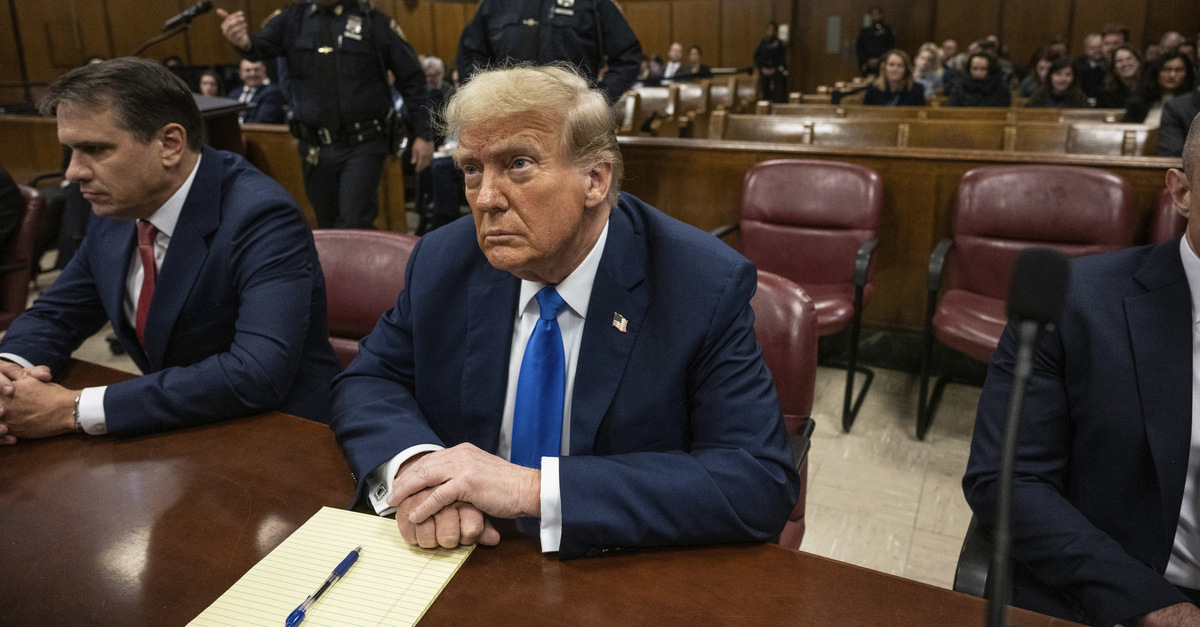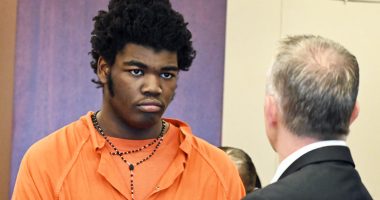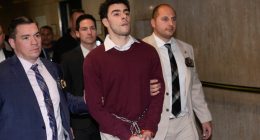
Former President Donald Trump sits in court on the first day of opening arguments in his trial at Manhattan Criminal Court in New York, Monday, April 22, 2024. (Victor J. Blue/The Washington Post via AP, Pool)
The hush-money trial for former president Donald Trump, 77, kicked off in earnest with opening statements in the borough of Manhattan, in New York City, New York County on Monday morning.
The defendant faces a 34-count felony indictment over allegedly falsified business records related to payments made to adult film star Stormy Daniels, 45, during the waning days of the 2016 election.
In the historic case, the first criminal prosecution of a former U.S. president, prosecutors have long alleged Trump fraudulently prepared certain business records to paper over an electoral conspiracy.
Prosecutors hewed to that script in the cold Centre Street courtroom.
It’s FREEZING
— Molly Crane-Newman (@molcranenewman) April 22, 2024
“This case is about a criminal conspiracy and a cover-up,” Senior Counsel Matthew Colangelo began. “The defendant, Donald Trump, orchestrated a criminal scheme to corrupt the 2016 presidential election, then he covered up that criminal conspiracy by lying on his New York business records over and over and over again.”
Over the course of this alleged cover-up, Trump falsified a total of 12 ledger entries, 11 invoices, and 11 checks, Colangelo told the jury, according to a report by Courthouse News reporter Erik Uebelacker.
The broader contours of the alleged conspiracy, however, required a few more players than simply Trump himself. The prosecutor went on to preview several key figures jurors are likely to hear about — if not directly from — during the course of the potentially lengthy trial.
Part and parcel of the alleged scheme was Michael Cohen, Trump’s longtime friend, attorney, and fixer, the prosecutor said.
And, perhaps even more integral was David Pecker, the onetime CEO of the National Enquirer‘s parent company, American Media Inc. The supermarket checkout stand publishing giant is well-known for the controversial practice called “catch and kill,” in which a publication buys a damaging story just to bury it. With such an arrangement, Colangelo said, Pecker would and lend his business empire to the cause of Trump’s winning 2016 campaign, with reporters and editors becoming the “eyes and ears” of the presidential bid, according to a report by Just Security fellow Adam Klasfeld.
On Monday, Colangelo relayed how the alleged architects of the hush-money scheme evidenced some concerns in a “flurry of text messages” about former Playboy model Karen McDougal’s claim to have had a nearly yearlong relationship with Trump, according to a report by New York Daily News reporter Molly Crane-Newman.
As Law&Crime previously reported, AMI paid McDougal $150,000 for her story and then kept it under wraps for years.
Then came Daniels — allegations of yet another affair that first swirled in the immediate aftermath of the infamous Access Hollywood tape where Trump casually discusses sexually assaulting women with talk show host Billy Bush. The campaign desperately wanted to keep Daniels’ story from seeing the light of day.
This time, the state alleges, Cohen was the initial source of the funds — using a shell company to hide the $130,000 hush-money payoff that would keep Daniels quiet until after the voting had ended.
“With pressure mounting and Election Day fast approaching, Donald Trump agreed to the payoff [to Stormy Daniels] and directed Cohen to proceed,” Colangelo reportedly told the jury. “It was election fraud.”
Have a tip we should know? [email protected]








